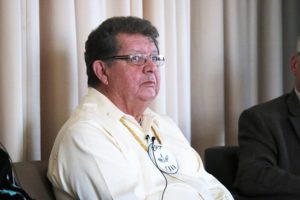Robinson Huron and Superior Treaty Trial Enters Phase 2

By Catherine Murton Stoehr
SUDBURY— Phase 2 of the Robinson Huron Treaty Trial began this week in Sudbury.
Phase 1 began in June of 2018 and concluded days before Christmas with a decisive victory for the Robinson Huron and Robinson Superior plaintiffs who successfully argued that Canada and Ontario have not paid annuities in keeping with the terms of the treaty.
This phase will focus on technical legal objections that the Crown is making to increasing or back paying any inadequate annuities.
The sticking point in the first trial had been a triad of clauses in the text of the treaty that Canada and Ontario have interpreted to justify uncoupling the annuity payments from increases in revenue from the land, and limiting the annuity to $4. It was this Crown interpretation that the Robinson Huron and Superior communities defeated at the first phase of the trial.
Phase 2 will only last for two weeks and is expected to have a very different tone from the first stage which featured rich storytelling and history sharing as the lawyers described the words, actions, and intentions of the Anishinabek and British people who negotiated and signed the Robinson Huron Treaty.
Joe Arvay, counsel for the Robinson Huron communities, explained the points of contention this time around.
“The Crown claims it is “immune” from being sued for breach of fiduciary duty for any acts or omissions prior to 1963. The Crown is also claiming that it can not be sued for breach of the treaty for any acts prior to 1994.”
These assertions rest on technical legal restrictions on the length of time a plaintiff can delay in bringing a complaint to the court, and limits on past liability.
Members of the Robinson Huron and Superior communities have pursued annuity increases tied to income from the land since mining had an uptick one year after the treaty was made. Residential schools, the pass system, and a law against First Nations people accessing lawyers in Canada, were all government instigated limitations that impeded the nations from bringing their claims forward. That those same governments are now asking a judge to dismiss the Anishinabek’s claim because of conditions they themselves caused may be hard for some to contemplate.
As Mike Restoule, Nipissing First Nation member and Chair of the Robinson Huron Litigation Trust, put it:
“The agreement reached in 1850 was to share the revenue gained. We have been fighting for our fair share of that revenue since the mid 1800s. It’s time that the Crown governments honour their end of the bargain.”
Why is this trial in phases? Basically, because it’s really complicated. Two parties on each side, myriad historical and legal issues to be adjudicated one at a time, a 169+ year timeline, and money and interest and inflation. To corral the process into a logical structure so-called “case management meetings” were held. There, the issues were divided into three phases. The first to determine if the Crown was right to limit the payments to $4, a second, happening now to consider technical legal objections to the claim, and a third, should it be necessary, to determine amounts owing, and payments going forward.
Arvay noted some unique elements of the Robinson Huron and Superior treaty trial, “the augmentation provision which ties increases in the annuity payments to the development of wealth over a territory larger than France” and the fact that it is being brought “on behalf of tens of thousands of Anishinabek beneficiaries.”
Arvay also referenced the sacred fire, feasts, and other ceremonies that court officials have shared in with Anishinabek community members throughout the proceedings noting that this trial could set precedents “because of its recognition of the Indigenous law and custom in a way not before recognized in courts.”
In a statement released, members of the Robinson Huron Litigation Fund and the Robinson Huron Chiefs expressed frustration that Canada and Ontario are leaving this matter to an expensive and adversarial court process rather than negotiating a settlement. They singled out provincial actions that have delayed the court proceedings noting that Ontario,
“Is appealing the decision of Madam Justice Hennessy and advanced a motion to re-open phase one of the case on the basis that they had fresh evidence to support their defence against the claim. The motion was denied. We, as Chiefs believe that Ontario has chosen the path of litigation. It represents an adherence to the adversarial relationship and is consistent with their approach to abandon reconciliation even in the name of the Ministry.”
Restoule summed up the situation.
“Our people have been subsidizing Canada since it became a country and the British Crown long before that. The British and French monarchies grew rich from the extraction of resources from our territories, from the fur trade to modern mining and forestry industries of today. Untold trillions of dollars have been gained from our lands. We continue to subsidize Canada today while our communities suffer in poverty.”


